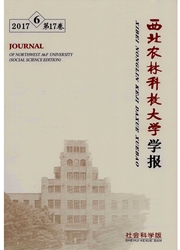

 中文摘要:
中文摘要:
以柑橘为例,基于我国柑橘主产区9省(区、市)28县(市)867户橘农的调查数据,建立面板数椐模型,实证分析了农业投入品价格和人民币汇率变动对不同规模(大、中、小)、不同经营方式(专业、兼业)的柑橘比较优势的影响。研究结果表明,农业投入品价格上涨和人民币升值对不同规模、不同经营方式的柑橘比较优势均产生一定的负面影响。在相同种植规模条件下,农业投入品价格上涨和人民币升值对专业化经营的柑橘比较优势的影响程度小于对兼业化经营的柑橘比较优势的影响;在相同经营方式条件下,农业投入品价格上涨和人民币升值对较大规模专业化经营的柑橘比较优势的影响程度小于对较小规模经营的柑橘比较优势的影响,而对较大规模兼业化经营的柑橘比较优势的影响程度大于对较小规模经营的柑橘比较优势的影响。说明在现阶段农地制度下,柑橘主产区大规模专业化经营方式为适度规模经营模式,其他规模经营方式为非适度规模经营方式。
 英文摘要:
英文摘要:
Taking citrus for an example, based on the survey data of 867 farmers in main citrus producing areas in 28 counties of nine provinces, the article builds a panel data model to find out the direction and degree of impact of agricultural inputs prices and the RMB exchange rate on international competitiveness of citrus with different production scale and different operation mode. The results show that: agricultural inputs prices rising and RMB appreciation have negative impact on comparative advantage of citrus in main citrus producing areas in China. Un- der the condition of the same production scale, the negative impact of inputs prices rising and RMB appreciation on the comparative advantage of citrus with professional management is smaller than that of citrus with concurrent business operation; under the condition of the same cultivation method, the negative impact of inputs prices rising and RMB appreciation on the comparative advantage of citrus with large produetion scale and professional management is smaller than that of small-scale, and the negative impact of inputs prices rising and RMB appreciation on comparative advantage of citrus with large-scale and concurrent business operation is larger than that of small- scale. It indicates that in current agricultural land system, the large production scale and specialized operation mode are moderate, while other kinds of production scale and operation mode are not appropriate in main citrus producing areas.
 同期刊论文项目
同期刊论文项目
 同项目期刊论文
同项目期刊论文
 期刊信息
期刊信息
